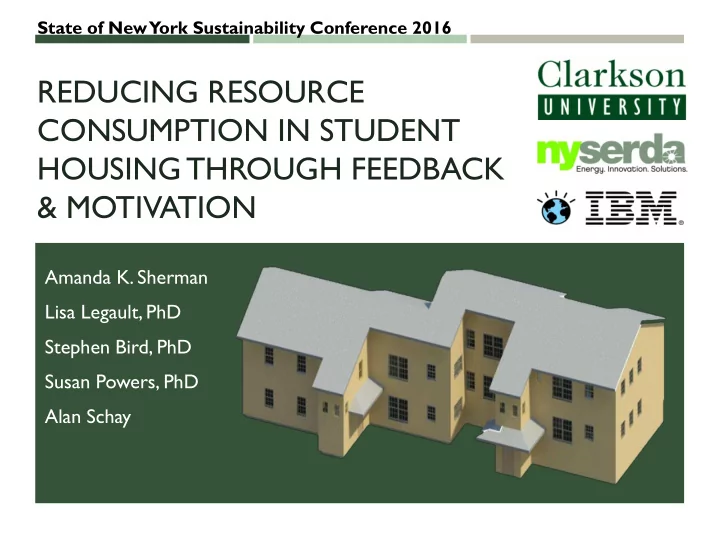

State of New York Sustainability Conference 2016 REDUCING RESOURCE CONSUMPTION IN STUDENT HOUSING THROUGH FEEDBACK & MOTIVATION Amanda K. Sherman Lisa Legault, PhD Stephen Bird, PhD Susan Powers, PhD Alan Schay
Why do people waste energy and resources? • People waste A LOT of energy Individual human actions exert significant • effects on climate change, environmental destruction, and resource depletion Waste occurs despite incentive • programs & regulations • We know we need to behave in more pro-environmental ways. Yet…we don’t. WHY?
Why do people waste energy and resources? We suggest 2 main reasons: • People either lack motivation , or have the “wrong kind” of motivation Lack of connection to the goal of conservation • External incentives (or split-incentive) issues • • People don’t know how to conserve
Main objectives of this research • To develop and test interventions that target personal motivation to conserve electricity and water • To test the effectiveness of continuous and timely energy and resource feedback
Hypotheses Main effect of motivation Main effect of feedback Cumulative effect of motivation + feedback Effects explained by changes in attitudes and motivation
Overview of experimental design
Targeting personal motivation: The intervention Reflected on and wrote about their own • reasons for wanting to conserve energy and water Health concerns • Environmental destruction • Climate change • Financial cost • Preserving the earth for future • generations Energy security • Set group electricity and water goals • Pledged commitment to their goals • Motivational “nudges” throughout spring • semester
Providing energy feedback • First, students’ electricity and water consumption was measured (at baseline) Type Breakdown Electricity Lights Outlets Stove/Oven Refrigerator Other/Misc. Water Hot Cold Overall Between the 4 buildings, over 3,600 • variables are collected every minute!
Feedback interface
Design and testing: Utility use For electricity and water: High Feedback vs. Low Feedback a) Personal Motivation vs. No Motivation b) Combined Motivation + Feedback vs. c) Neither We compared effects across 77 • Woodstock apartments Electricity and water use recorded over a • 3 month period
Design and testing: Survey responses We also measured various psychological variables across all participants (N=353 individuals in 77 apartments) Type of motivation toward the environment (internal, external, or • amotivated) Environmental emotions (distress, empathy, disgust) • Environmental competence/knowledge • Self-reported frequency of proenvironmental behaviors (e.g., recycling) • Enjoyment of proenvironmental behaviors •
Results What did we find?
Preliminary findings: Descriptive statistics and correlations among utility variables Electricity Overall Water Hot Water (Wh/day/person) (G/day/person) (G/day/person) Mean 2240.27 31.14 15.30 Standard Deviation 752.55 11.00 5.90 Skewness .97 1.36 .93 Kurtosis .73 1.05 1.052 Correlations Overall Water .21 Hot Water .27* .89*** *p<.05; ***p<.0001
Preliminary findings: Correlations among survey variables External Amotiv. Empathy Disgust Distress Knowledge Behavior Enjoyment Personal -.02 -.53*** .60*** .59*** .38*** .25*** .54*** .64*** Motivation External .34*** -.10 -.01 -.07 -.10 ϯ .00 .14* Motivation Amotivation -.56*** -.43*** -.12 ϯ -.26*** -.37*** -.30*** Empathy .78*** .58*** .26*** .49*** .58*** Disgust .67*** .22** .42*** .55*** Distress .05 .29*** .41*** Knowledge .20** .12* .43*** Behavior Ϯ p<.10; *p<.05; **p<.01; ***p<.0001
Differences in enjoyment of PEB as a function of feedback 4.2 4.1 4 3.9 3.8 3.7 3.6 3.5 High Feedback Low Feedback F(1, 258)=4.900, p=.028, Ƞ p2=.020
Mediating effect of enjoyment Enjoyment -.11 ϯ .13* Feedback Electricity -.30*** Ϯ p<.10; *p<.05; ***p<.0001
Effects of motivation and feedback on daily electricity consumption Hi/Hi 20% less than control (F(1,39)=4.88, p=.033, η 2 p =.11) 2472 2500 2360 2208.49 2000 1889 Wh/day/person 1500 1000 500 0 Personal Motivation No Motivation High Feedback Low Feedback
Effects of motivation and feedback on daily hot water use 20.6% difference 17.56 18 16.5 16 13.8 13.24 14 Gallons/day/person 12 10 8 6 4 2 Personal Motivation No Motivation High Feedback Low Feedback
Conclusions • Several hypotheses supported Effect of feedback on electricity • Combined effect of feedback + motivation on electricity (-20%!!!) • Effect of motivation on hot water (-20.6%!!!) • Campus-wide or nation-wide scale = substantial savings $ • But, no effect on overall water • • Mechanisms to reduce hot water may be different than mechanisms to reduce electricity Feedback system was not effective in targeting major sources of hot • water consumption, such as shower time. Rather, motivational intervention appears to work better in this domain .
Regrding the feedback screens… • Those who received the feedback intervention reported significantly greater enjoyment of PEB compared to those who did not receive feedback • This was the sole effect of interventions on motivation • Feedback screens caused residents to enjoy saving energy and engaging in proenvironmental ways. Presumably, feedback made energy conservation more fun and interesting • Thus may be more prudent to focus on developing the intrinsically interesting and aesthetically enjoyable aspects of feedback screens.
What’s next? • Given the importance of personal motivation in promoting PEB, how can we take this further? highly personalized motivational messaging • How can we better integrate personalized motivational messages with feedback displays? “Why might YOU want to conserve energy and water?"
Thank you! We would like to acknowledge those who have contributed their invaluable time and constructive feedback to improve the quality of our work.
Recommend
More recommend